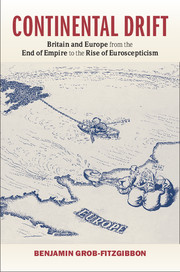Book contents
- Frontmatter
- Dedication
- Contents
- Acknowledgements
- List of abbreviations
- Introduction
- Part 1 Imperial Europeans
- Part 2 Post-imperial Eurosceptics
- 10 At sixes and sevens
- 11 Towards the Common Market
- 12 The rise of the anti-Marketeers
- 13 Empire eclipsed, Europe embraced, Britain rejected
- 14 Entering the promised land? Britain joins ‘Europe’
- 15 Seasons of discontent
- 16 Half-hearted Europeans
- 17 Mrs Thatcher, John Major and the road to European Union
- Conclusion: Post-imperial Britain and the rise of Euroscepticism
- Notes
- Bibliography
- Index
10 - At sixes and sevens
from Part 2 - Post-imperial Eurosceptics
Published online by Cambridge University Press: 05 May 2016
- Frontmatter
- Dedication
- Contents
- Acknowledgements
- List of abbreviations
- Introduction
- Part 1 Imperial Europeans
- Part 2 Post-imperial Eurosceptics
- 10 At sixes and sevens
- 11 Towards the Common Market
- 12 The rise of the anti-Marketeers
- 13 Empire eclipsed, Europe embraced, Britain rejected
- 14 Entering the promised land? Britain joins ‘Europe’
- 15 Seasons of discontent
- 16 Half-hearted Europeans
- 17 Mrs Thatcher, John Major and the road to European Union
- Conclusion: Post-imperial Britain and the rise of Euroscepticism
- Notes
- Bibliography
- Index
Summary
Eden sought continuity in his cabinet following his ascent to the premiership, intentionally demonstrating a unity of purpose with the Churchill government. Macmillan tacked a different course, promoting Peter Thorneycroft as Chancellor of the Exchequer and moving Duncan Sandys to the Ministry of Defence. The press immediately noticed that the new Prime Minister had brought two of Parliament's most ardent Europeans into the inner cabinet, the Labour MP Richard Crossman opining in the Daily Mirror that Macmillan's reshuffle revealed ‘a lot about the policy he intends to follow’. In particular, his aim in foreign policy would be ‘a European Third Force, led by Britain and backed by the United States’. Crossman disapproved, but felt sure that Britain's North American allies would be satisfied: ‘The Americans have always believed in the United States of Europe and blamed us British for dragging our feet. … If Mr. Macmillan can get together with the French and Germans and create a Third Force which can stand on its own feet without dollar assistance, no one will be happier than the Americans’.
If Crossman was hostile to Macmillan's European turn, those on the continent were more receptive. The Foreign Secretary Selwyn Lloyd reported from Rome on 18 January 1957 that the Italian government was ‘most friendly’ towards the British position and wanted to further discuss Lloyd's ‘grand design’ for Europe. In particular, the Italians had welcomed his call for a wider European Free Trade Area (FTA), including and closely associated with the organisations of ‘the Six’, which would ‘lead the way to cooperation between us and Europe’. Consequently, and with Italian support, the British government submitted a memorandum to the Organisation of European Economic Cooperation (OEEC) outlining UK plans for a European FTA in early February. The French Ambassador René Massigli commended it and suggested to Macmillan that the British government ‘hurry with our plans for European unity’. It was, as one historian has written, ‘European policy par excellence. … [I]t was extremely clever in both conception and design. From a British point of view, moreover, it promised neatly to defuse the European problem … without compromising either Britain's Commonwealth ties or, still more vital for the Treasury, the world-wide role for sterling’.
- Type
- Chapter
- Information
- Continental DriftBritain and Europe from the End of Empire to the Rise of Euroscepticism, pp. 225 - 248Publisher: Cambridge University PressPrint publication year: 2016



